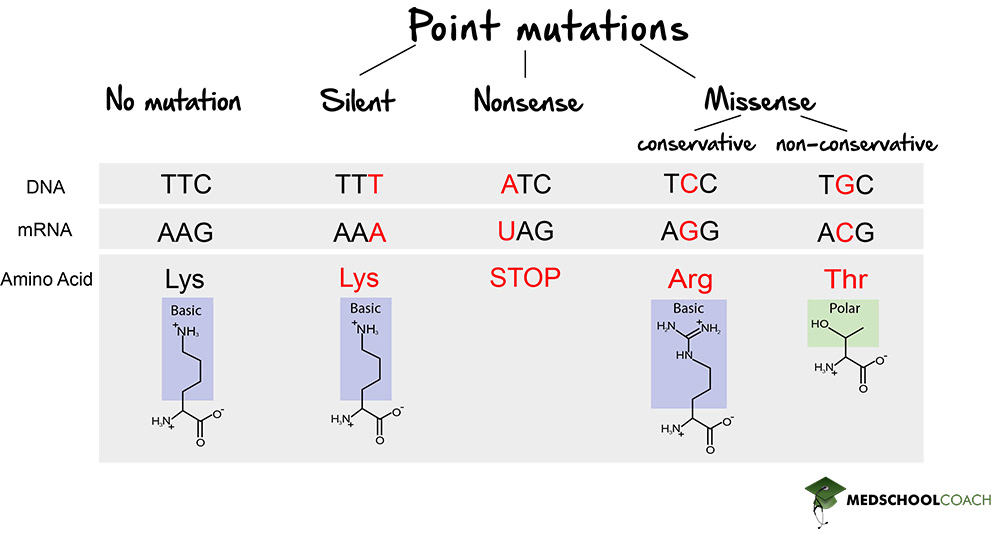Mutations
MCAT Biology - Chapter 1 - Section 2.4 - DNA - DNA Replication & Repair
- Home
- »
- MCAT Masterclass
- »
- Biological and Biochemical Foundations of Living Systems
- »
- Biology
- »
- Mutations – MCAT Biology
Sample MCAT Question - Mutations
Which type of DNA mutation results in the same amino acid?
a) Silent
b) Nonsense
c) Missense
d) Frameshift
A is correct. Silent.
There are several different types of DNA mutations. One type is called a point mutation, in which one nucleotide in a codon is replaced by another. A silent mutation is a type of point mutation in which the nucleotide substitution in a codon results in a new codon that codes for the same amino acid as the original. There is no observable effect of silent mutations. Answer choices B, C, and D are all mutations that result in different amino acids or stop codons.
A is correct. Conservative model.
According to the conservative model, the parental DNA molecule directs the synthesis of brand new DNA strands, but is left untouched. The daughter DNA molecules are therefore completely new. B is incorrect because according to the semiconservative model, one strand from the parental DNA is incorporated into each of the daughter DNA molecules. C is incorrect because according to the dispersive model, the parental DNA is broken up and distributed throughout the new DNA molecules.
Get 1-on-1 MCAT Tutoring From a Specialist
With MCAT tutoring from MedSchoolCoach, we are committed to help you prepare, excel, and optimize your ideal score on the MCAT exam.
For each student we work with, we learn about their learning style, content knowledge, and goals. We match them with the most suitable tutor and conduct online sessions that make them feel as if they are in the classroom. Each session is recorded, plus with access to whiteboard notes. We focus on high-yield topics if you’re pressed for time. If you have more time or high-score goals, we meticulously cover the entire MCAT syllabus.
Mutations
Mutations are changes in DNA sequences. They can arise spontaneously, from errors during DNA replication, mitosis, or meiosis, from damage to the DNA structure, or from mutagens, which are physical or chemical agents that can cause genetic changes. Mutations can result in several changes to the DNA structure, such as the substitution of nucleotides or the addition or removal of nucleotides. There are several different types of DNA mutations that are important to know for the MCAT exam.
Point Mutations
One type of mutation is known as a point mutation (Figure 1). Point mutations are mutations in which one nucleotide is replaced by another. Some specific diseases caused by point mutations are certain cancers, neurofibromatosis, Sickle cell anemia, Tay-Sachs disease, and even color blindness. There are three types of point mutation important for the MCAT: silent mutations, missense mutations, and nonsense mutations.

Another type of point mutation is a missense mutation, which is a mutation that results in a different amino acid sequence, or primary structure, in the product protein. The impact of missense mutations can vary. In some cases, the mutation results in amino acids that are very similar to each other. These types of missense mutations are known as conservative missense mutations. For example, if a nucleotide that codes for lysine is mutated and now codes for arginine, this will not have a significant impact on the protein, because both lysine and arginine are basic amino acids. However, if a missense mutation changed a hydrophobic amino acid such as phenylalanine to an acidic amino acid such as aspartic acid, then that could have very significant impacts on the function of the protein.
The last type of point mutation is a nonsense mutation. A nonsense mutation is a mutation that results in the formation of a stop codon. There are only three possible stop codons, and if one forms through a mutation, it can have a tremendous impact on the protein. For example, if the nonsense mutation happens at the beginning or middle of the protein, this can result in a significantly truncated protein that may not function at all. If the mutation happens at the end of the protein sequence, the effect may not be as significant.
Insertion & Deletion Mutations
Aside from point mutations, insertions and deletions, or indels for short, are important mutations to know as well (Figure 2). Insertions are the addition of nucleotides, and deletions are loss of nucleotides. Mainly both result in changing the original number of nucleotides. An indel in increments of three nucleotides will either add an amino acid to a protein or delete an amino acid from a protein. Adding or deleting whole amino acids can affect protein function, but not as much as when the indel is not in increments of three. This latter type of mutation is known as a frameshift mutation (Figure 2).
A frameshift mutation is an indel mutation in which the codon being inserted or deleted is not divisible by three. As a result, a frameshift mutation can alter the reading frame of the entire amino acid sequence. A reading frame alteration can impact every codon after the insertion or deletion, and could also result in the formation of a stop codon. In other words, a frameshift mutation can have a substantial impact on the protein being coded and its function. Diseases caused by frameshift mutations include colorectal cancer, Crohn’s disease, cystic fibrosis, and hypertrophic cardiomyopathy.

Explore More MCAT Masterclass Chapters
Take a closer look at our entire MCAT Masterclass or explore our Biochemistry lessons below.

One-on-One Tutoring
Are you ready to take your MCAT performance to a whole new level? Work with our 99th-percentile MCAT tutors to boost your score by 12 points or more!
See if MCAT Tutoring can help me
Talk to our enrollment team about MCAT Tutoring

MCAT Go Audio Course
Engaging audio learning to take your MCAT learning on the go, any time, any where. You'll be on the way to a higher MCAT score no matter where you are. Listen to over 200+ lessons.

MCAT Practice Exams
Practice makes perfect! Our mock exams coupled with thorough explanations and in-depth analytics help students understand exactly where they stand.

MCAT Prep App
Access hundreds of MCAT videos to help you study and raise your exam score. Augment your learning with expert-created flashcards and a question banks.